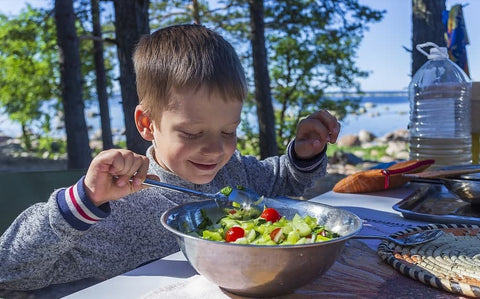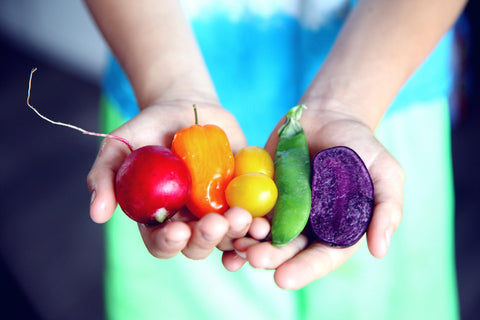With Memorial Day Weekend behind us, it is officially the start of summer! One of the hallmarks of summer, and every kid’s favorite part, is no school! COVID restrictions are being lifted in most parts of the US, so this summer is particularly shaping up to be one for the books. The world of wellness has expanded its reach over the past year with home workouts becoming a staple in many peoples’ routines, while others have spent their extra time at home in the kitchen, perhaps learning some cooking skills. Many social media outlets have really used their platforms to promote healthy eating and mindfulness practices to get us all through the seemingly never ending months of quarantine. Perhaps it is through this expanded reach that you came across the field of Nutritional Psychiatry and learned about my work. Have you made dietary and lifestyle changes with the intention of improving your own mental fitness and emotional wellbeing? If so, I am sure you have come to understand just how powerful the foods we eat can be in influencing how we think and feel! But what if I told you that the pillars of Nutritional Psychiatry are not only applicable to, and effective for, adults, but that our children also have an incredible potential to benefit from a diet full of nutritious brain foods? In fact, because their brains are still developing, such foods are crucial for ensuring proper growth and development and supporting children’s cognitive and emotional potential.
Let’s be real though, ‘eating the rainbow’ is probably more appealing to most kids in the form of a bag of Skittles rather than a nutrient dense and veggie packed salad! Combatting the sometimes picky and stubborn palates of children and feeding them three brain food meals a day may require some creativity and persistence. The following guidance is intended to not only inform you of which nutrients are most important for your child, but also provide tips and tricks for incorporating such mood boosting ingredients into their diet, as well as a few lifestyle practices to support their curiosity and cognitive development. Let’s make it a healthy, delicious, feel good summer for the whole family!
Childhood Nutrition
The first few years of life set the foundation for thinking, learning and brain health. The foods children are fed and the behaviors they are taught towards food are effective in promoting their future physical and mental health, particularly cognition, temperament, motor skills and language development. Many studies show that starting babies off with a nutritious and balanced diet in infancy is key to promoting long-term health and well-being. It is recommended that childhood foods be diverse and include plenty of nutrients that support growth and development. Specifically, foods rich in omega-3 fatty acids, vitamins A, B12 and D, as well as iron, folate, iodine, zinc and choline support optimal brain development. Similarly, avoiding processed junk foods with added sugars or chemicals can prevent the development of sugar addiction and poor mental health caused by the inflammation associated with eating these foods. The following are plant based food ideas to help your children get started in nutritious eating:
-
Superfood smoothies: for children, smoothies are a tasty way to incorporate lots of nutrients into the diet, and perhaps disguise some foods that they resist eating. In fact, call it a “milkshake” if it helps. Easily throw a handful of folate and fiber rich leafy greens into the blender, along with hemp seeds, chia seeds or walnuts which are full of plant based omega-3’s, antioxidant rich berries and creamy avocado which is high in both vitamins and minerals for a power food smoothie full of nutrients to support your child’s physical and mental growth. Bonus tip: adding plain unsweetened dairy or coconut yogurt can increase your smoothie’s creaminess and add protein, as well as gut healthy probiotics!
-
Roasted, Steamed or Air Fryer veggies: if you’re familiar with Nutritional Psychiatry, you know that eating a colorful variety of vegetables is so important for getting enough fiber and nutrients, as well as fueling both gut health and mental health. Roasting or steaming vegetables like broccoli, squash, asparagus, cauliflower and carrots will help soften foods for young children and the variety of textures and colors will keep children interested and curious all while providing them with anti-inflammatory mood boosting nutrients. Another idea is using an air fryer oven which adds that crispy crunch texture without frying. Try zucchini, carrot or green bean fries. Also adding spices and herbs, as your child will tolerate, such as turmeric with a pinch of black pepper, rosemary, oregano, parsley and thyme will add flavor and brain boosting power!
- Plant based dips and spreads: lentils and legumes are healthy, plant based sources of iron, zinc, protein and fiber, benefitting both the gut and the brain. Homemade hummus is a great and versatile way to incorporate these foods into your child’s diet and can be used in so many ways – from a dip with veggie sticks or a spread on seed crackers! Think bright orange carrot hummus or a deep purple beet monster dip, or a Green Ninja spinach dip. Perhaps consider following my recipe for ‘Avocado Hummus’ on page 250 of my book This Is Your Brain on Food for an even more nutritious take!
The summer is a wonderful time for enjoying fresh fruits and vegetables, as so many are now in season! On your next trip to the grocery store or farmers market, encourage your child to pick out a variety of different colored fruits and vegetables for a diversity of nutrients to be included in any of the above food ideas. Stay tuned for an upcoming blog post with even MORE brain food ideas for kids, including non plant based options!




